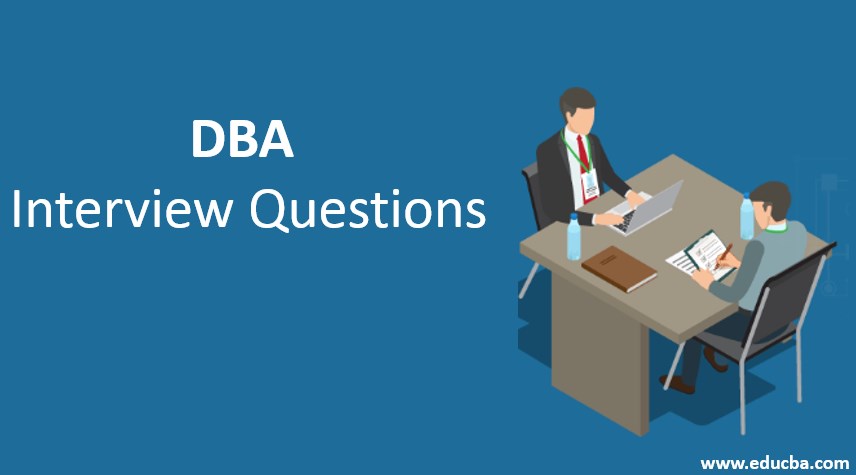Updated July 6, 2023

Introduction to DBA Interview Questions
Preparing for a job interview in DBA. I am sure you want to know the most common 2023 DBA Interview Questions and answers that will help you crack the DBA interview with ease. Below is the list of top DBA Interview Questions and answers to your rescue. We will discuss the important DBA interview questions every aspiring candidate should know.
DBA Interview Questions and Answers
Below are the 5 important 2023 DBA interview questions and answers that are frequently asked in an interview.
Q1. Explain Oracle and its database.
Answer:
Oracle, in itself, is a company. All this is done to ensure high performance is never compromised. A DB server prevents unauthorized access to data and provides mechanisms for failure recovery. Oracle provides its solutions to create and manage its database.
Q2. Explain the role of DBA and its characteristics.
Answer:
DBA has the right to create new users, update existing users and modify environment variables or any other kind of privilege assigned to the users.
The roles include:
- Manage database storage
- Manage schema objects
- Administer security and users
- Manage and monitor database performance
- Schedule and automate jobs
- Perform backup and recovery
The characteristics of DBA include:
| Criterion | Result |
| Architecture | Grid Architecture |
| Storage Structure | Logical and Physical |
| ACID based Compliance | Fully Compliant |
| Data is Stored as | Data extents, Blocks, Tablespaces, and Segments |
Q3. Describe common Oracle Tasks.
Answer:
As you are an Oracle Database Administrator, you can expect yourself to be related to the following tasks:
- Installing the software.
- Create Oracle Databases.
- Maintaining and performing regular and scheduled updates to both database and software.
- Starting up, monitoring, and closing the database.
- Managing and taking care of the database’s storage schemas and structures.
- Managing the security of users.
- Monitoring and managing user schema functions and objects like tables, views, and indexes.
- Periodic backup and data recovery in case of data failure and ensure high availability.
- Proactive in monitoring the health and taking appropriate corrective and preventive measures as and when needed.
Performance tuning and management of a small, midsize database environment is generally an expectation. In that case, you would not need to worry about being the database administrator and managing the security parameters.
Q4. List down the tools used to administer the database. Explain SQL Plus and its operations.
Answer:
The following tools can be used in achieving the goals of a DBA.
- Oracle Universal Installer: This tool installs the basic and recommended set of Oracle software. It is used to launch the Database Configuration Assistant (an essential tool for Database) automatically.
- Database Upgrade Assistant: It is used to guide the upgrade of an existing database to a fresh Oracle release.
- Oracle Net Manager: This tool is used to guide through the Oracle Net network-related configurations.
- Oracle Enterprise Manager: The Oracle Enterprise Manager is the tool for your database management. It is a web-based interface that only runs once you have installed the software, created and upgraded the database, and tuned and configured the network as per your needs. It is a highly efficient single interface manager. It also provides interfaces for performance advisors and other interfaces related to performance utilities as well. The performance utilities include the ones like Recovery Manager and SQL Loader.
Below are some characteristics of the
SQL Plus Tool:
- It is a freely distributable software that is shipped along with Oracle Database installations and client installations by default.
- The executable name in the case of Linux OS sqlplus and sqlplus.exe in the case of Windows OS.
Recommended Articles
This is a guide to DBA Interview Questions. Here we have listed the most useful interview sets of questions so that the jobseeker can crack the interview with ease. You may also look at the following articles to learn more –
